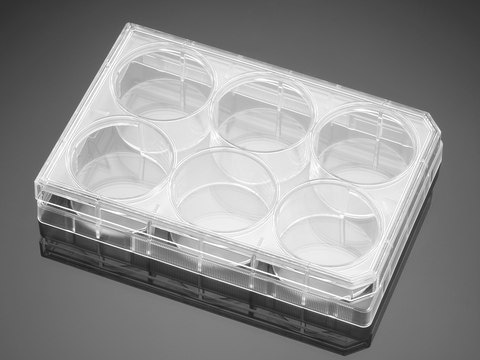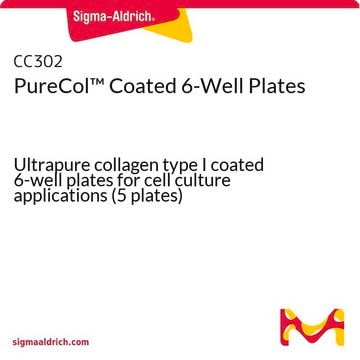SIAL0516
Sigma® cell culture plate
size 6 wells, sterile, tissue-culture treated, pack of 50 ea individually wrapped
Sign Into View Organizational & Contract Pricing
All Photos(1)
About This Item
UNSPSC Code:
41122107
NACRES:
NB.22
Recommended Products
material
clear polystyrene plate
clear wells
description
growth area 9.5 cm2
with lid
sterility
sterile
packaging
pack of 50 ea individually wrapped
size
6 wells
well diam.
34.8 mm
color
clear
binding type
Tissue Culture (TC)-treated surface
Looking for similar products? Visit Product Comparison Guide
General description
- Non-reversible lids with condensation rings to reduce contamination
- Individual alphanumerical codes for well identification
- Uniform footprint for ease in stacking
- Treated for optimal cell attachment
- Sterilized by gamma irradiation
- Certified nonpyrogenic
Legal Information
Sigma is a registered trademark of Sigma-Aldrich Co. LLC
Certificates of Analysis (COA)
Search for Certificates of Analysis (COA) by entering the products Lot/Batch Number. Lot and Batch Numbers can be found on a product’s label following the words ‘Lot’ or ‘Batch’.
Already Own This Product?
Find documentation for the products that you have recently purchased in the Document Library.
Kaisen Lin et al.
PloS one, 15(12), e0243505-e0243505 (2020-12-09)
The survival of viruses in droplets is known to depend on droplets' chemical composition, which may vary in respiratory fluid between individuals and over the course of disease. This relationship is also important for understanding the persistence of viruses in
Kaisen Lin et al.
Environmental science & technology, 54(2), 1024-1032 (2019-12-31)
The transmission of some infectious diseases requires that pathogens can survive (i.e., remain infectious) in the environment, outside the host. Relative humidity (RH) is known to affect the survival of some microorganisms in the environment; however, the mechanism underlying the
Ryosuke Koyama et al.
Bioorganic & medicinal chemistry, 28(11), 115492-115492 (2020-04-16)
Effective chemotherapy for solid cancers is challenging due to a limitation in permeation that prevents anticancer drugs from reaching the center of the tumor, therefore unable to limit cancer cell growth. To circumvent this issue, we planned to apply the
Our team of scientists has experience in all areas of research including Life Science, Material Science, Chemical Synthesis, Chromatography, Analytical and many others.
Contact Technical Service





